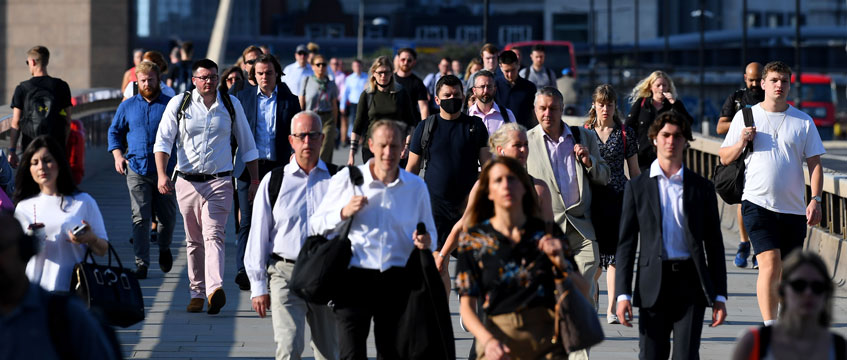A century ago, the US industrialist Henry Ford made a commercial decision that would change the world. He gave his workers, across more than 50 businesses and seven industries, Saturday off. Suffice to say, it caught on.
Now the concept of a shorter working week will be revisited once more. In June this year around 60 businesses across the UK will take part in a six-month experiment to see what happens when more than 3,000 staff are given an extra day off work, with no reduction in pay. For some, the five-day working week introduced by Ford, which has since become the global norm, is about to become a four-day working week.
The experiment, which is the largest pilot of its kind and will run alongside similar schemes in the US, Ireland, Canada, Australia and New Zealand, is being taken pretty seriously in terms of research and will be assessed by academics from Oxford, Cambridge and Boston universities.
But what results will they be looking for? How might a four-day working week work in practice on a larger scale and who does it benefit? And what could it mean for office assets and, as a by-product, the retail sector?
Fewer hours, more profits?
In the UK, the pilot is being led by think-tank Autonomy and the 4 Day Week UK Campaign. They hope it will prove Ford’s reasons for truncating the working week in 1926 still hold true today. That by working fewer hours, we become happier, healthier and more productive.
“We believe we are long overdue an update,” says UK campaign director Joe Ryle. “The nine-to-five, five-day working week is outdated and no longer fit for purpose. The world has moved on since Henry Ford.”
The campaign hopes to improve wellbeing by giving employees a better work-life balance, allowing them time to rest, spend time with family and friends, pursue hobbies, and do all of the life admin tasks that we somehow squeeze into our hectic lives.
But the idea is not to cram more hours of work into fewer days. That would defeat the object, Ryle insists. “The fundamental thing for us is that hours are reduced, so that you move down to a 32-hour week spread over four days. Otherwise you only increase the likelihood of burnout.”
And, vitally, the salary stays the same. One of the campaign’s slogans is “100% of the pay for 80% of the hours”.
It may sound like a sure-fire way to bankrupt businesses. But doing this, the campaign says, will not only make businesses more attractive to talent, it could make them more profitable, too.
The nine-to-five, five-day working week is outdated and no longer fit for purpose. The world has moved on since Henry Ford
The claim is borne out by research. In 2019, a Henley Business School study found that 250 firms participating in a four-day week saved an estimated £92bn a year because their employees were happier, less stressed and took fewer sick days. Incidentally, it is the same claim made in the Labour Party’s 2019 election manifesto.
When Labour’s then leader Jeremy Corbyn laid out plans for a four-day, 32-hour week in a leaders’ debate, Boris Johnson was scathing. “What could be more ruinous than a crackpot plan for a four-day week?” he scoffed to laughter from the audience.
The plan, he said, was just like Corbyn’s Labour – a relic from the 1970s.
Vintage or visionary?
It is true the four-day week was popular in the 1970s. “It has been kicking around for decades,” says Lee Daniels, JLL’s EMEA head of workforce.
It is also no coincidence that Ryle’s previous job was as an adviser to former shadow chancellor John McDonnell. But he insists, politics aside, there is true merit to this concept. Particularly post-pandemic when working practices were turned on their head.
“There is a lazy, cultural assumption that the nine-to-five, five-day working week is the best way of doing things, simply because that is how we have always done things,” he says. “But we haven’t always done it this way. And this is clearly not the best way as it is causing the immense burnout, stress, overwork and mental health issues that arise in the British workplace.”
Ryle hopes the pilot will change that assumption, helped by the fact that the world has changed a great deal in the past two years. The pandemic has radically altered working patterns and the Great Resignation is forcing businesses to focus more keenly on what its workforce actually wants.
According to JLL research, 60% of staff now expect their employers to support a healthy work-life balance and 71% want help managing their workloads.
“There has been a shift in power towards employees, and their mindsets have changed,” says Daniels. “People want more flexibility and time for family priorities.”
A four-day week is one way businesses could do this. “If businesses give back a day of the work week to employees, it can add significant value for current and future talent and help to revitalise the post-pandemic workplace,” says Daniels.
So is this something JLL is considering for its own business and staff?
Daniels gives a lupine grin. “It’s one of many elements that we are looking at for clients,” he says. “But are we looking at it for ourselves? No. Well, we are looking at it. But have we executed anything? No.”
Absent agents
Although none of the major property agencies are taking part in the pilot, Ryle says that of the 60 businesses signed up, “a few” are “property-related”, and he is talking to more about a future pilot.
Only about 30 names have been published so far, ranging across a gamut of sectors and sizes, from computer game designers to the Royal Society of Biology and a fish and chip shop in Norfolk. But none are from the real estate sector.
“The property industry is not an area where we have had much take-up,” he muses. “I’m not sure why that would be.”
However, a handful of “property-adjacent” firms are already accredited as having four-day working weeks by the campaign, including the London-based Causeway Irish Housing Association, Bristol-based workspace firm Forward Spaces and Barefoot Architects.
All of these businesses report a successful adoption of the four-day week, happier staff, improved productivity and healthier profits. Why then are the likes of JLL not more keen to get in on the action?
“It’s a problem of scale and complexity,” says Daniels. “Also, I just don’t think it would work for us.”
Isn’t it worth a try, though? In a time of economic uncertainty, a magic bullet that can both make the workforce happier and make the economy boom seems too good to be true. “That’s because it is,” says Daniels.
Sam Goss, founder of Barefoot Architects, which adopted a four-day week two years ago, says he completely understands that attitude.
“There is a lot of fear and scepticism in the industry,” he says. “But it comes from a place of anxious greed, and that leads to bad decisions.”
Instead, he says his colleagues in the industry should take “positive risks” and focus on the benefits.
“The team are better rested, more motivated and happier,” he says. “The clients then get the benefit of that. And the business becomes more attractive to clients.”

Unintended consequences
In terms of the impact on assets, the four-day working week concept proves to be a complex issue.
Currently a vast amount of money is spent by businesses on office buildings that they use for five days out of every seven. That equates to just over 70% usage. Cutting off that extra day would bring that down to just 57%. “Would that have an impact on what businesses are looking for? What they are willing to pay?” Daniels asks. “Maybe.”
Potentially this could give rise to spaces being shared, more community uses being established in workspaces, or to more shift work.
A longer weekend could also prove a benefit to other sectors. “It may open up Friday as a new ‘weekend’ shopping day,” says James Hardiman, senior analyst at the British Retail Consortium.
It could also simply result in office locations being emptier for longer.
“If offices around the country were to move to a four-day week, it would reduce footfall for those retailers that rely on commuters,” warns Hardiman.
That is already happening anyway with changing work patterns, says Daniels. “Places like Canary Wharf have always been fairly empty on a Monday and Friday.”
He argues that technology is driving the change. “And that is happening regardless of whether you work a four-day, five-day or seven-day week.”
Technology, says Daniels, is giving businesses the tools to offer talent what they most want: choice, variety and flexibility.
“A four-day working week – that’s not really providing choice, flexibility or variety, is it?”
For Ryle, the new technology is exactly why we need to make this change. “When you think about the productivity gains made in the last couple of decades, none of that has fed through to a reduction in working hours or had an impact on leisure time,” he says.
A century ago, Ford said had he introduced the five-day week 20 years earlier, or even five years earlier, it would have been detrimental to productivity, because industry had not been sufficiently automated.
Compromises
Just because we can do something, doesn’t mean we should. Even those who support the change acknowledge that cutting down to a four-day week means some compromises have to be made. “It really makes you focus on how you use your time,” says Goss. “You can’t have long lunches or mess about.”
For a people-focused industry such as real estate, that may be where the cultures clash.
“You will always have workaholics, just the same as you will always have those who like to take their time,” says Daniels. “What you have to do is give them flexibility.”
As other working practices become more entrenched, he says, such as remote working, flexible working and even virtual working, the presumed need for a four-day week will disappear. “Just like it did in the 1970s. This is something that is going to peter out.”
Goss firmly disagrees. “No, this is going to grow and grow and grow,” he says. “There is a lot of interest, everyone is talking about it.” He says he frequently gets calls from other businesses eager to know more.
“There is a hunger for change, especially from younger people, and they will choose the firms that offer this,” he says. “We are more productive than we were three years ago. And it isn’t just us. Look at the evidence – almost every business that has tried this has reported the same thing. Every single sector it has been tried in has seen that it raises productivity.”
And, as Ryle points out, there are very few examples of businesses that have gone back to a five-day week after trialling a four-day model.
“Be cynical, but give it a go,” urges Goss. “Do it critically. Test and measure.”
And if it does increase productivity, stick with it. “We didn’t do this because it was a nice thing to do,” Goss points out. “We are a commercial business; we did this for commercial reasons. We may be called Barefoot, but we aren’t a bunch of hippies.”
After all, not even Henry Ford thought the five-day week was the perfect balance. “The five-day week is not the ultimate, and neither is the eight-hour day. It is enough to manage what we are equipped to manage and to let the future take care of itself. It will anyway.”
To send feedback, e-mail piers.wehner@eg.co.uk or tweet @PiersWehner or @EGPropertyNews











